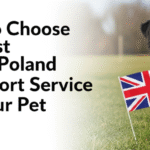Moving a dog or cat from the United States to Cyprus sounds straightforward until you start looking into aircraft rules, import paperwork, transit stops, vaccination schedules, crate sizing, and the stress animals feel on long journeys. Most people come to this topic already worried: Will my pet stay calm in the air? Will they be monitored? Will the jet meet welfare standards? Will customs officers accept the documents?
These worries make sense, especially when the travel involves a long transatlantic route. That’s why so many owners begin their research with the Best USA to Cyprus Private Jet Pet Transport Service — not because they want something extravagant, but because they want their pet handled correctly.
The biggest advantage of luxury flight support is the control it gives you. Instead of your pet sitting in a crowded cargo bay with unfamiliar noises, a private cabin offers stable air pressure, noise-reduced environments, predictable climate control and far smoother workflows for the airport handover. Your pet is seen as a passenger, not cargo.
That alone removes a huge layer of anxiety. Add in expert handlers, pre-flight checks, veterinary supervision, breed considerations and import compliance, and the journey becomes far more predictable.
What makes luxury pet travel different from standard flights?
Private jet relocation isn’t just about being on a nicer aircraft. There are very specific operational differences that directly affect animal comfort. Here’s what typically changes when you choose a premium provider:
- Pets usually travel in the cabin instead of cargo
- They are monitored throughout the flight by trained handlers
- Crate placement is adjusted based on weight, temperament, and breathing profile
- Cabin environment remains stable with controlled temperature and humidity
- There are fewer transfers, reducing stress and injury risk
- Veterinary documents are pre-checked by import advisors to avoid airport delays
- You can choose a flight schedule that suits your pet’s feeding cycle
For example, brachycephalic breeds like Pugs or English Bulldogs often struggle with fluctuating pressure in airline cargo. On larger commercial planes, even with airline compliance, their breathing can become strained. With a private aircraft, the pressure and ventilation are far more consistent. This is a technical difference — not a luxury one — and it’s the kind of detail that completely changes the experience for sensitive breeds.
How can I be sure the flight operator is compliant with Cyprus import rules?
Cyprus enforces specific rules for pets entering from the USA, following both EU Pet Travel regulations and Cyprus Veterinary Services requirements. These standards include microchip verification, rabies antibody testing, flight health certificates, and airline-friendly crate sizing. A strong provider will handle all the following:
- USDA-endorsed health certificate
- Rabies neutralising antibody titration test (RNAT test)
- Microchip standard verification (ISO 11784/11785)
- TAP table checks for vaccination timelines
- Arrival port coordination with Larnaca or Paphos airport veterinary officers
- Crate checks according to IATA guidelines
- Fit-to-fly assessment
- Flight manifest inclusion for cabin animals
The right company won’t just “mention” compliance — they’ll walk you through every requirement using your pet’s timeline. For instance, the RNAT test alone requires a 30-day waiting period after vaccination before the blood sample is taken, and then another 3 months before entry is allowed. Many owners get stuck here because they didn’t count days correctly. Strong relocation teams calculate this for you automatically.
Should I choose a shared private jet or a fully chartered one?
There are two broad options when moving pets on private aircraft:
shared flights and full charters. Each serves different budgets and preferences.
Shared private jets
You share the plane with other pet owners. This lowers the price significantly and still offers cabin comfort. It works well for:
- Owners with smaller pets
- Families that don’t need full privacy
- People who want a cost-effective upgrade
- Pets used to meeting other animals
- Trips planned in advance (because shared schedules depend on demand)
Full private jet charters
This is the most comfortable option. You control the entire cabin environment. It suits:
- Large breeds needing more space
- Multiple pets travelling together
- Nervous or reactive animals
- Owners who prefer full privacy
- Time-sensitive relocations
If you’re unsure where your case fits, think of temperament and size first. A single calm Maltese dog may do well in a shared cabin. A large, easily stressed German Shepherd might benefit more from a dedicated aircraft.
What types of aircraft are used for USA to Cyprus pet travel?
Routes from New York, Miami, Los Angeles, Chicago, and Houston often connect to European hubs before continuing to Cyprus. Common aircraft used by pet-focused operators include:
- Gulfstream G550 / G650
- Bombardier Global 6000 / Global 7500
- Dassault Falcon 7X / 8X
- Embraer Lineage 1000
- Cessna Citation Longitude
These jets offer stable pressure environments and larger cabin zones that allow comfortable pet crate placement. The G650, for example, maintains remarkably even cabin pressure. For older pets or animals with respiratory sensitivity, this consistency makes a genuine difference. They don’t need to adjust repeatedly to altitude shifts.
What are the real costs?
Prices vary a lot depending on aircraft type, season, and whether you choose shared or chartered options. Here’s a general breakdown to help you compare providers clearly:
Typical Cost Ranges
| Service Type | Estimated Cost (USD) | Notes |
| Shared Private Jet Seat | $7,500 – $18,000 | Depends on route, season, and number of pets |
| Full Private Jet Charter | $65,000 – $140,000 | Aircraft type, route, and fuel variation |
| Veterinary Pre-Flight Package | $250 – $1,000 | Exams, endorsements, paperwork |
| Cyprus Import Handling | $300 – $600 | Airport veterinary review |
| Pet Handler or Escort | $1,500 – $4,000 | For owners unable to travel |
These numbers might look steep, but for people relocating long-term or moving rare breeds, keeping the pet safe becomes the priority. Owners often see it as a one-time investment in reducing physical and emotional stress.
How do handlers keep pets calm during long flights?
Specialist teams typically follow a structured workflow:
- Pre-flight familiarisation with the crate
- Comfort checks (bedding, non-spill bowl, chew-safe materials)
- Pre-flight exercise
- Potty breaks where airport rules allow
- Monitoring breathing rate, posture, anxiety signals
- Adjusting crate position in-cabin for airflow
- Gentle reassurance during turbulence
- Providing veterinarian-approved calming aids (if prescribed)
- Keeping to feeding intervals to avoid vomiting
For example, animals prone to anxiety often benefit from scent-based comfort. Many handlers ask owners to include a t-shirt or blanket that carries their scent. This small detail has been shown to lower cortisol levels in pets during travel.
What documents do I need for Cyprus?
Pet owners must gather:
- ISO-compliant microchip
- Rabies vaccination certificate
- RNAT test results
- Tapeworm treatment (for dogs)
- USDA-endorsed EU Health Certificate
- Airline/IATA crate documentation
- Fit-to-fly certificate
- Owner ID
- Travel itinerary
Many owners are surprised by how early the timeline begins. If your pet has never had the RNAT test before, the process alone can push the relocation date several months ahead.
What questions should I ask providers before booking?
Here are essential questions to help you compare companies:
- Do you offer cabin travel for all breeds?
- What aircraft models are used for this route?
- Who monitors pets during the flight?
- Are veterinary staff involved in pre-flight checks?
- How do you handle reactive or anxious animals?
- What is your process for RNAT and USDA paperwork?
- How many pets can fly on the same aircraft?
- What happens if Cyprus border control requests additional checks?
- How do you handle delays or diversions?
A reliable service provider won’t hesitate to explain these in detail.
How does arrival in Cyprus work?
Cyprus Veterinary Services oversees animal arrivals at Larnaca and Paphos. The process usually takes:
- Microchip scan
- Document verification
- Health check
- Crate inspection
- Release approval
Most checks finish within 45–90 minutes when paperwork is accurate. Private flights often receive priority handling because the schedule is pre-coordinated.
Can pets quarantine in Cyprus?
Cyprus does not require quarantine for pets entering from the USA as long as they meet RNAT and vaccination rules. If something is missing, pets may face:
- Delayed release
- Extra testing
- Additional fees
- Temporary holding facility
That’s why companies specialising in US–EU routes focus heavily on document accuracy.
How do I compare providers fairly?
Use this comparison method:
1. Check flight experience
How many transatlantic pet flights have they managed?
2. Check veterinarian involvement
Are qualified veterinarians reviewing documents?
3. Look for breed management
Do they understand breed-specific needs?
4. Ask about in-flight monitoring
Are handlers trained? Do they record vitals?
5. Read real customer feedback
Look for owners who transported similar breeds.
6. Evaluate transparency
Legitimate companies outline all fees openly.
7. Assess their Cyprus arrival support
Do they handle both Larnaca and Paphos clearance?
A lot of companies mention “pet transport” but only deal with domestic routes. Make sure they genuinely specialise in international aviation.
What breeds usually benefit the most from private jet relocation?
- French Bulldogs
- English Bulldogs
- Pugs
- Shih Tzus
- Boxers
- Persian cats
- Himalayan cats
- Older dogs with arthritis
- Large breeds like Great Danes
- Working dogs needing extra space
Short-muzzle dogs often struggle in traditional aircraft holds. Private jets reduce temperature fluctuation and noise, both major triggers for respiratory distress.
What mistakes do owners commonly make during the process?
- Leaving the RNAT test too late
- Choosing a crate that’s too small
- Not preparing the pet for long confinement
- Handing over incomplete documents
- Forgetting USDA endorsement deadlines
- Assuming Cyprus rules are identical to other EU entry rules
- Expecting last-minute flight availability
Think of the timeline like moving a child internationally — there are steps that simply cannot be skipped.
How can I prepare my pet before the flight?
Your preparation makes a big difference:
- Get vet checks early
- Allow crate familiarisation gradually
- Use reward-based crate training
- Maintain the same feeding schedule
- Include a comfort item
- Avoid high-energy meals before flying
- Exercise before arriving at the airport
- Share your pet’s behaviour profile with handlers
Crate familiarisation is particularly important. If your pet sees the crate as a safe place, they settle far better during air travel.
Why do some pets need escorts?
Escorts are helpful when:
- Owners cannot fly due to work commitments
- Pets require behavioural supervision
- Animals have medical conditions needing monitoring
- Documentation must be presented on arrival
- Multiple pets are travelling at once
Escorts manage feeding, reassurance, crate checks, and communication with Cyprus authorities.
What happens if my pet gets stressed mid-flight?
Handlers follow clear steps:
- Check posture and breathing
- Offer reassurance
- Adjust crate airflow
- Reduce sensory triggers (lights, noise)
- Use vet-approved calming supports
This is where professional handling stands apart. Stress signs are subtle, and trained staff can intervene before it escalates.
Conclusion
Choosing a luxury route for your pet’s journey from the United States to Cyprus isn’t about being extravagant — it’s about making sure your companion is safe, calm, and correctly handled for a long international trip. With trained handlers, predictable cabin environments, structured veterinary workflows, and support through Cyprus’s import requirements, premium private jet travel reduces nearly every major stress point owners face.
If you decide you want support from specialists who understand this journey in detail, you can always speak with Pearl Lemon Pets for personalised guidance.


